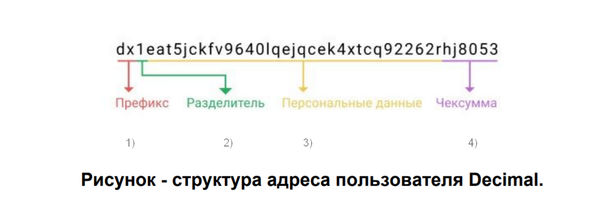Decimal address format: Difference between revisions
| [unchecked revision] | [checked revision] |
CryptoUser (talk | contribs) m (CryptoUser moved page Commoninfo:addressformat to Decimal address format) |
|||
| (3 intermediate revisions by 3 users not shown) | |||
| Line 1: | Line 1: | ||
{{#seo: | |||
|title= Decimal address format - Decimal Wiki | |||
|titlemode= append | |||
|keywords= Decimal address format | |||
|description= Decimal Address Format | |||
}} | |||
'''Decimal address''' is the account number containing letters, numbers and symbols of the Latin alphabet. The address can be presented as a [[wikipedia:QR code|QR code]], is anonymous and does not contain information about the owner. | |||
Through the address, you can perform operations of transferring / receiving any tokens of the [[Decimal ecosystem|DecimalChain ecosystem]], like working with e-mail messages. One person can create an unlimited number of addresses, for example, increasing the level of anonymity of their payments. | |||
== Historical background == | |||
One of the specific features of [[blockchain]]s (first [[Bitcoin]], and then many others) are address formats, the problem of which was that it makes it much more difficult for users to read them correctly. | |||
Blockchain enthusiast and developer [[wikipedia:Pieter Wuille|Pieter Wuille]] has proposed to modernize the format of addresses on the Bitcoin network. This proposal is known as BIP 173, or 4 bc1 addresses, and as of May 2020 it has been successfully implemented in a significant number of crypto projects, including those outside the Bitcoin blockchain. | |||
At the moment, the implemented changes are known as the [[Bech32]] address format. | |||
== Address in Decimal == | |||
The Decimal team supports Bech32 and provided it already at the start of the DecimalChain project. | |||
=== The address of Bech32 has a length that does not exceed 90 characters, and contains : === | |||
[[File:Wiki-2020-12-11_16-46-20.png|600px|thumb|right]] | |||
* A part that is easy for a person to read. This includes data that may need to be transmitted or that has something to do with the owner of the address, at least one character long. For example, by default, "bc" characters are used for mainnet addresses, and "tb" characters are used for testnet. | |||
* The separator is the last of the characters "1". | |||
* The data part is at least six characters long and consists of alphanumeric characters only, excluding "1", "b", "i", and "o". | |||
* Сheck-sum. The last six characters of the data part form a checksum and do not contain any information. | |||
''All letters are lowercase, although it is possible to convert them to uppercase to generate a QR code.'' | |||
== Address entry conditions == | |||
{{warning|In order to avoid errors when manually entering the address, it is recommended to use the [[clipboard]]. Manual input is case-sensitive. If the address is entered incorrectly, the [[coin]]s are sent to the wrong address or the [[transaction]] is rejected.}} | |||
[[Category:Commoninfo]] | |||
[[Category:Blockchain]] | |||
[[Category:Cryptography]] | |||
[[Category:Decimal Console]] | |||
[[ | |||
Latest revision as of 10:01, 15 February 2024
Decimal address is the account number containing letters, numbers and symbols of the Latin alphabet. The address can be presented as a QR code, is anonymous and does not contain information about the owner.
Through the address, you can perform operations of transferring / receiving any tokens of the DecimalChain ecosystem, like working with e-mail messages. One person can create an unlimited number of addresses, for example, increasing the level of anonymity of their payments.
Historical background
One of the specific features of blockchains (first Bitcoin, and then many others) are address formats, the problem of which was that it makes it much more difficult for users to read them correctly.
Blockchain enthusiast and developer Pieter Wuille has proposed to modernize the format of addresses on the Bitcoin network. This proposal is known as BIP 173, or 4 bc1 addresses, and as of May 2020 it has been successfully implemented in a significant number of crypto projects, including those outside the Bitcoin blockchain.
At the moment, the implemented changes are known as the Bech32 address format.
Address in Decimal
The Decimal team supports Bech32 and provided it already at the start of the DecimalChain project.
The address of Bech32 has a length that does not exceed 90 characters, and contains :

- A part that is easy for a person to read. This includes data that may need to be transmitted or that has something to do with the owner of the address, at least one character long. For example, by default, "bc" characters are used for mainnet addresses, and "tb" characters are used for testnet.
- The separator is the last of the characters "1".
- The data part is at least six characters long and consists of alphanumeric characters only, excluding "1", "b", "i", and "o".
- Сheck-sum. The last six characters of the data part form a checksum and do not contain any information.
All letters are lowercase, although it is possible to convert them to uppercase to generate a QR code.